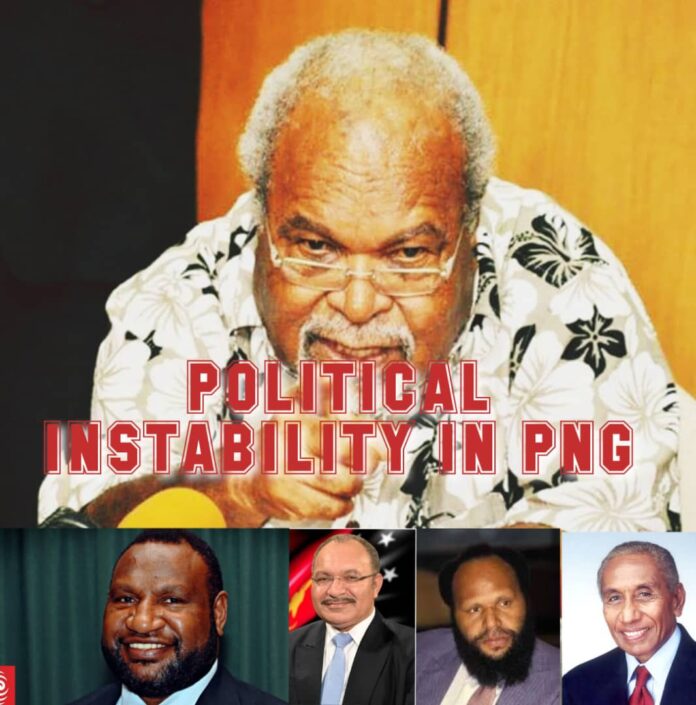ANALYSIS PART 1
The standard definition of political instability is the propensity of a government collapse either because of conflicts or rampant competition between various political parties. Also, the occurrence of a government change increases the likelihood of subsequent changes. Political instability tends to be persistent.
Economic growth and political stability are deeply interconnected. On the one hand, the uncertainty associated with an unstable political environment may reduce investment and the pace of economic development.
On the other hand, poor economic performance may lead to government collapse and political unrest.
Is there political instability in PNG?
The short Asnwer is Yes!
The PNG Westminster Parliamentary system of government has been fragile and unstable since the political independence of 1975. The adaptation of the democratic ideology was not incorporated well with our established Melensians ideologies.
For example Samoa got its independence in January 1, 1962 that is 13 years earlier than ours in 1975. Their incoperation of democratic political ideology was implemented well with the established Matai Chiefman system unlike ours.
Samoa is now 61 years old with a stable democratic system. Samoa political system has been stable for the past 61 years compared to ours.
In the last 48 years PNG has had total of 9 Prime Ministers compared to Samoa 7 in 61 years. PNG has three ( 3) successful VoNC while Samoa has nil.
Successive PNG Governments have managed politics more than policy and economy administrativly. Due to the Multi Party political System the effective functionality of the democratic process has been affected.
PNG has a very weak and ineffective political system compared to other democracy. For example, there are currently 53 Political Parties registered with the Registry. Some of these political parties have no members or even Party leaders are non parliamentarian.
In this multi-party system with numerous political parties, in which no one party often has a chance of gaining power alone, and parties must work with each other to form coalition governments.
Coalition Government try to please the coalition members with the appointment of incompetent and unqualified MPs into strategic ministeral portfolios. This has been the practise since 1975.
Political parties in the country are generally based on the personality of their leaders, rather than on any concrete ideology. That is where the problem is .
There must be political stability to bring development. It is imperative that impact projects can only be delivered if governments serve an uninterrupted term in parliament. The mid-term changes of government is the reasons for preventing development to take place. The governments of the late Sir Michael Somare and Peter O’Neill delivered some impact projects right around the country because they survived a full-term.
Rule of law and political stability must be improved to boost PNG economy. The Pangu Led- Marape – Rosso Government often reiterate its commitments to promote a broad-based sustainable development to boost the country’s economy. However, PNG has continued to have weak performance in the rule of law and political stability. This restricts the country from achieving its full potential in development.
Political instability is likely to shorten policymakers’ horizons leading to sub- optimal short term macroeconomic policies. It may also lead to a more frequent switch of policies, creating volatility and thus, negatively affecting macroeconomic performance.
CHANGES OF GOVERNMENT SINCE 1975
Do you know that we ve changed governments 18 times since 1975. This term the 11th Parliament would be the 19th if our politician prefer. See our records and think:
- 1975 Somare Government
- 1977 Somare Government
- 1980 Chan Government
- 1982 Somare Government
- 1985 Wingti Government
- 1987 Wingti Government
- 1988 Namaliu Government
- 1992 Wingti Government
- 1995 Chan Government
- 1997 Skate Government
- 1999 Mekere Government
- 2002 Somare Government
- 2007 Somare Government
- 2011 O’Niel Government
- 2012 O’Niel Government
- 2017 O’Niel Government
- 2019 Marape Government
- 2022 Marape Government.
We have been a country busy playing politics over 48 years rather than building it. Government after government no stability. We need stability going forward.
Now we come to votes of no confidence
In total, since independence, PNG has had nine prime ministers elected on the floor of Parliament following a general election, but only two have completed their terms: Michael Somare (2002 to 2007) and Peter O’Neill (2012 to 2017).
Somare was replaced by Peter O’Neill in 2011 on the disputed grounds of ill-health. Three PMs have been replaced through votes of no confidence (Somare by Julius Chan in 1980, Somare by Wingti in 1986, and Wingti by Rabbie Namaliu in 1988) and three others resigned to avoid a vote of no confidence (Wingti in 1993, Skate in 1998 and O’Neill in 2019)
When there is instability there is no stability in the implementation of polices and developmental agenda. You will notice that less or none was achieved by successive governments because of the political instability.
We will be 50 years on 2025. Will we keep on managing and playing politics or we will restore credibility and stability in our democratic governance system.
Below are my personal recommendations on how to go about beyond 2023 to see real transitions and transformation in the government and political system.
1: The Registery of Political Parties must review the Organic Laws on Elections and introduce dual political party system just like in Australia and US. All other small parties can incorporate with either of these two major parties.
This will pave way for appointment of state ministers on meritocracy and not for political survival
We will have clear policy line to vote for. Implementation of government polices will be easily monitored
That will enable our government system to be competitive and strong
2: There must be amendments to Constitution S142, S145, & OLIPP S63 – Securing Political Stability.
There must be amendment that Governor General appoints the Prime Minister upon national election and not elected by Parliament
This will pave ways for political stability and effective management of our governance system
3: The PNG CLRC Must review relevant laws to make sure ;
The Speaker of the House is appointed from outside of the Parliament and not elected byt Pareliament for neutrality
And the Voting of PM by the people must be effectively implemented in 2027 election
Importantly we must call for the adaptation of Biometric voting’s in the 2027 election
4: Let the Marape – Rosso Government complete this term for the sake of political stability
Connct PNG Policy is progressing well, lets see if they can connect PNG
Economic independence trough resources ownership, SME’s and Agriculture is progressing well, lets see if they can make our country economically independent
You be the judge in 2027! Now let this Pangu Government finish its term.
These are few of the recommendations I can think of. There are many issues need to be fixed in this country but I believe we need to fix the political system and governance first.
Thanks and may God bless PNG.
Complied by Nason Mul Solo- Political Analyst


